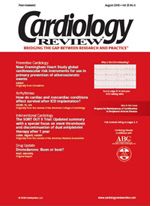Point-of-care platelet assay finds high rate of aspirin resistance
CAD/Angina
Orlando—Using an in-office system to test response to antiplatelet agents, one fourth of aspirin users with coronary artery disease (CAD) were found to be resistant to its antiplatelet effects. New research presented at the American College of Cardiology Annual Scientific Session 2005 showed that women, the elderly, and those taking lower doses of aspirin were among those likely to be aspirin resistant.
“The effect of aspirin is not uniform,” said Wai-Hong Chen, MD, lead investigator of the study, but unfortunately aspirin is usually prescribed using a “one dose fits all” approach.
In his study, platelet inhibition was meas-
ured in 468 CAD patients using a point-of-care blood test (VerifyNow) that provides results expressed as aspirin reaction units (ARU) in 30 minutes. An ARU of 550 or greater indicates the absence of aspirin-induced platelet dysfunction. All patients had been receiving aspirin for a minimum of 4 weeks.
Aspirin resistance was observed in 27.4% of the study group. Univariate predictors of aspirin resistance were older age, female sex, anemia, renal insufficiency, and an aspirin dose of 100 mg or less. Multivariate analysis revealed that a low hemoglobin level and an aspirin dose of 100 mg or less were independent predictors of aspirin resistance.
Some 30.2% of patients taking 100 mg or less of aspirin were found to be resistant, compared with 16.7% of those taking 150 mg and none taking 300 mg, said Dr. Chen, assistant professor, Cardiology Division, University of Hong Kong. Because bleeding risk increases with increasing doses of aspirin, a balance between efficacy and safety needs to be achieved. “We need to give a dose that provides protection from myocardial infarction and stroke but does not put the patient at risk of bleeding,” he said. “We need to titrate the dose like we do in treating blood pressure and cholesterol.”
The next step in research is to study the clinical relevance of aspirin resistance. “We don’t know what happens to these patients in years to come,” said Dr. Chen.
Another study presented here demonstrated that resistance to aspirin and clopidogrel can occur together. Using the same platelet function assay, 15% of 80 patients undergoing elective percutaneous coronary intervention were found to be resistant to aspirin, 24% were resistant to clopidogrel, and 7.5% were resistant to both.
Previous research has shown an increased risk of ischemic events in patients who are resistant to aspirin or clopidogrel, said Elliott Antman, MD, professor of medicine, Harvard Medical School, Boston. Using higher doses we may be able to overcome resistance in some cases, he said. Other medications may interact with aspirin and clopidogrel, and avoidance of these medications may restore antiplatelet responsiveness.
An alternative antiplatelet agent called prasugrel is under investigation. In research presented here by Lars Wallentin, MD, professor of cardiology, Uppsala Clinical Research Center, Uppsala, Sweden, 101 aspirin-treated patients with atherosclerotic vascular disease were randomly assigned to one of five oral dosing regimens (four prasugrel regimens and one clopidogrel regimen). Patients receiving 40- or 60-mg loading doses of prasugrel achieved significantly higher levels of platelet inhibition compared with patients on a 300-mg loading dose of clopidogrel (P ≤ .002). After 28 days, the 10- or 15-mg maintenance dose of prasugrel was superior to a 75-mg clopidogrel maintenance dose at inhibiting platelets (P ≤ .002).
